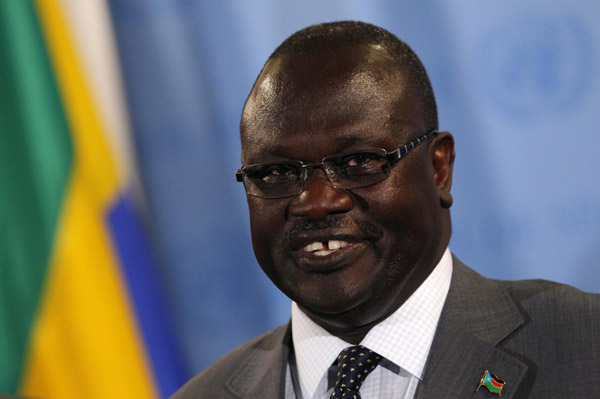South Sudan heads for UN membership
|
 South Sudan's Vice President Riek Machar Teny-Dhurgon speaks to the media following a United Nations Security Council meeting where the Council unanimously recommended admitting the newly formed nation of South Sudan into the United Nations at the UN headquarters in New York, July 13, 2011. [Photo/Agencies] |
UNITED NATIONS - The UN Security Council unanimously recommended on Wednesday the General Assembly approve five-day old South Sudan become a member of the United Nations.
The 192-member assembly is expected to approve membership on Thursday. Independence from Sudan was gained Saturday, following a January referendum and decades of conflict.
A flag-raising ceremony was scheduled to take place almost immediately after approval by the General Assembly.
"The council notes with great satisfaction the Republic of South Sudan's solemn commitment to uphold the purposes and principles of the Charter of the United Nations and to fulfill all the obligations contained therein," said a Presidential Statement read out by Guido Westerwelle, foreign minister of Germany, this month's president of the 15-member council.
"We look forward to the Republic of South Sudan joining us as a member of the United Nations and to working closely with its representatives," the brief statement concluded.
The resolution said the application was "examined" and that the panel of 15 "Recommends to the General Assembly that the Republic of South Sudan be admitted to membership in the United Nations."
"On the day of its birth, South Sudan ranks at the bottom of almost all human development indicators," said UN Secretary- General Ban Ki-moon who attended the independence ceremony and celebrations Saturday in Juba, capital of the new state. "Like any newborn, South Sudan needs help."
"Our responsibilities are enormous and the role of the UN is vital, but it is complicated," he continued.
A peacekeeping mission is being established for South Sudan while Ethiopian peacekeepers have beeb deployed in the contested north-south border town of Abyei.
"The situation in Southern Kordofan is deeply troubling," Ban added.
The secretary-general said resolving the tensions was " absolutely vital" because, "A viable South will need a viable North -- and vice versa. Together, South and North must face their common future as partners, not rivals."
Vice President of South Sudan Riek Machar Teny-Dhurgon agreed.
He told reporters after the council meeting, "As the new baby to the community we have challenges."
But Teny-Dhurgon expressed confidence they would be resolved.
"The internal issues are in the state-building," the vice president said. That is why we also accepted the presence of UN peacekeepers in southern Sudan. As to the post-independence issues, we have committed ourselves to continue negotiations with Khartoum.
"We have the will to resolve these problems since now we have contained them into security issues, citizenship, oil and the common borders and also particularly Abiyeh, which is governed by a protocol and we are asking for its full implementation," he added.
He concluded, "For the two states to be viable there is an immediate need for insuring that there is justice and peace in the two areas of southern Kordofan and Blue Nile," two more areas of conflict.
Jeffrey Thamsanqa Rebede, minister of justice and constitutional development for South Africa called South Sudan's achievement "a historic moment for the African continent and the people of South Sudan in their struggle for self-determination."
Recalling the struggle of his country's people for independence, he said South Africans "have identified with the aspirations and desire of the people of South Sudan for independence, freedom, justice and self-determination."
Rebede congratulated presidents Omar al-Bashir of Sudan and Salva Kiir of South Sudan "for the exceptional leadership they have demonstrated in the past six years since the signing of the Comprehensive Peace Agreement (CPA), to end more than 20 years of fighting between Khartoum and the southern separatists."
Wang Min, deputy permanent representative of the Chinese Mission to the United Nations called on the international community to continue to support South Sudan in realizing political stability and provide effective assistance for its economic recovery and development.
Foreign Minister Antonio de Aguiar Patriota of Brazil commended peoples of both the north and south of Sudan for their "political courage" in working towards nationhood.
"They proved wrong those who thought they could not work together for common goals," he said. "They remind this council that it can discharge its responsibilities under the (UN) Charter through negotiated diplomatic solutions."
De Aguiar Patriota recognized "the leadership role played in the early negotiations by the Intergovernmental Authority for Development (IGAD) and the central role played by the African Union throughout the process that led to the Comprehensive Peace Agreement" in ending the north-south conflict.
Former South African President Tabo Mbeki has been widely praised for his role in the CPA.





















